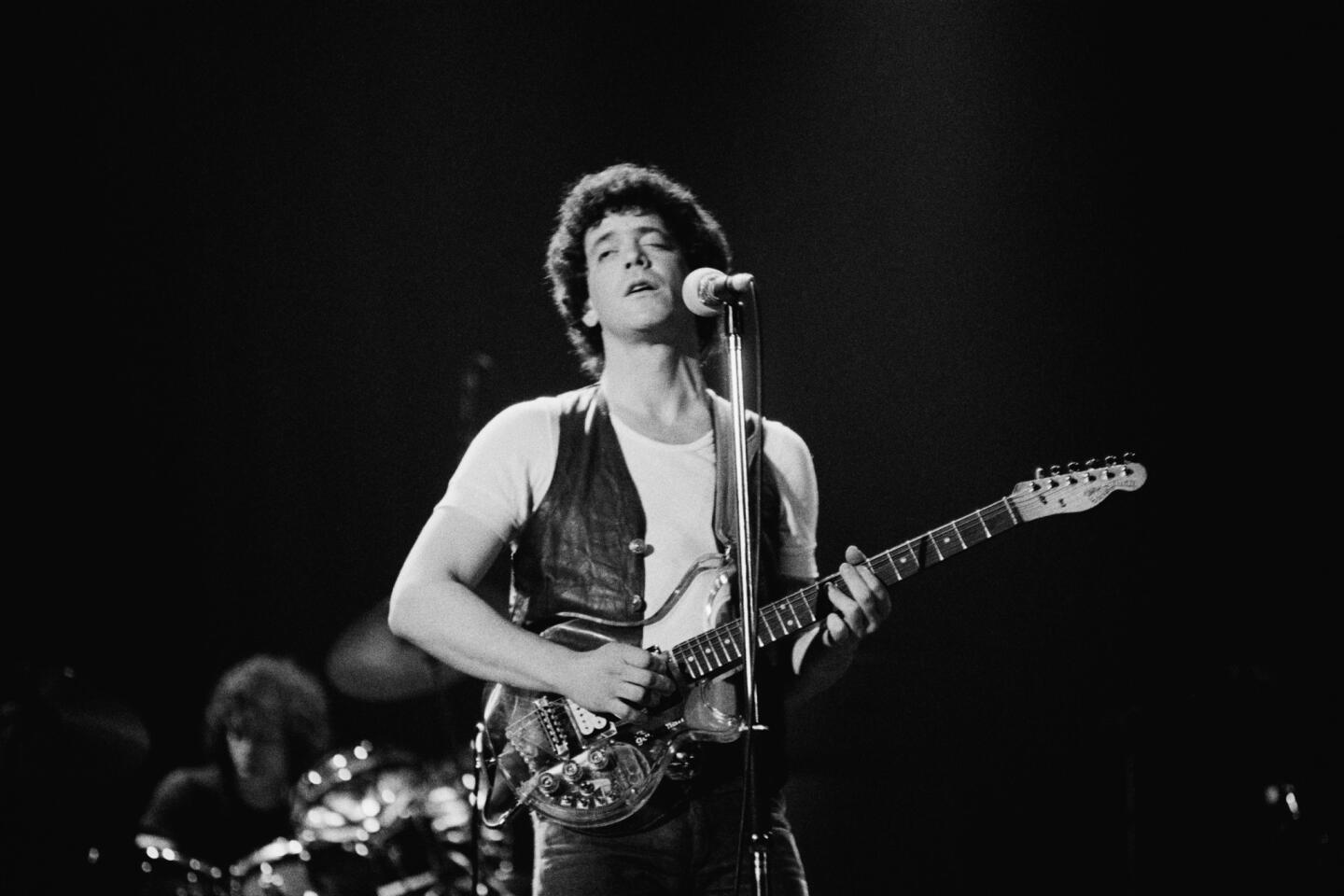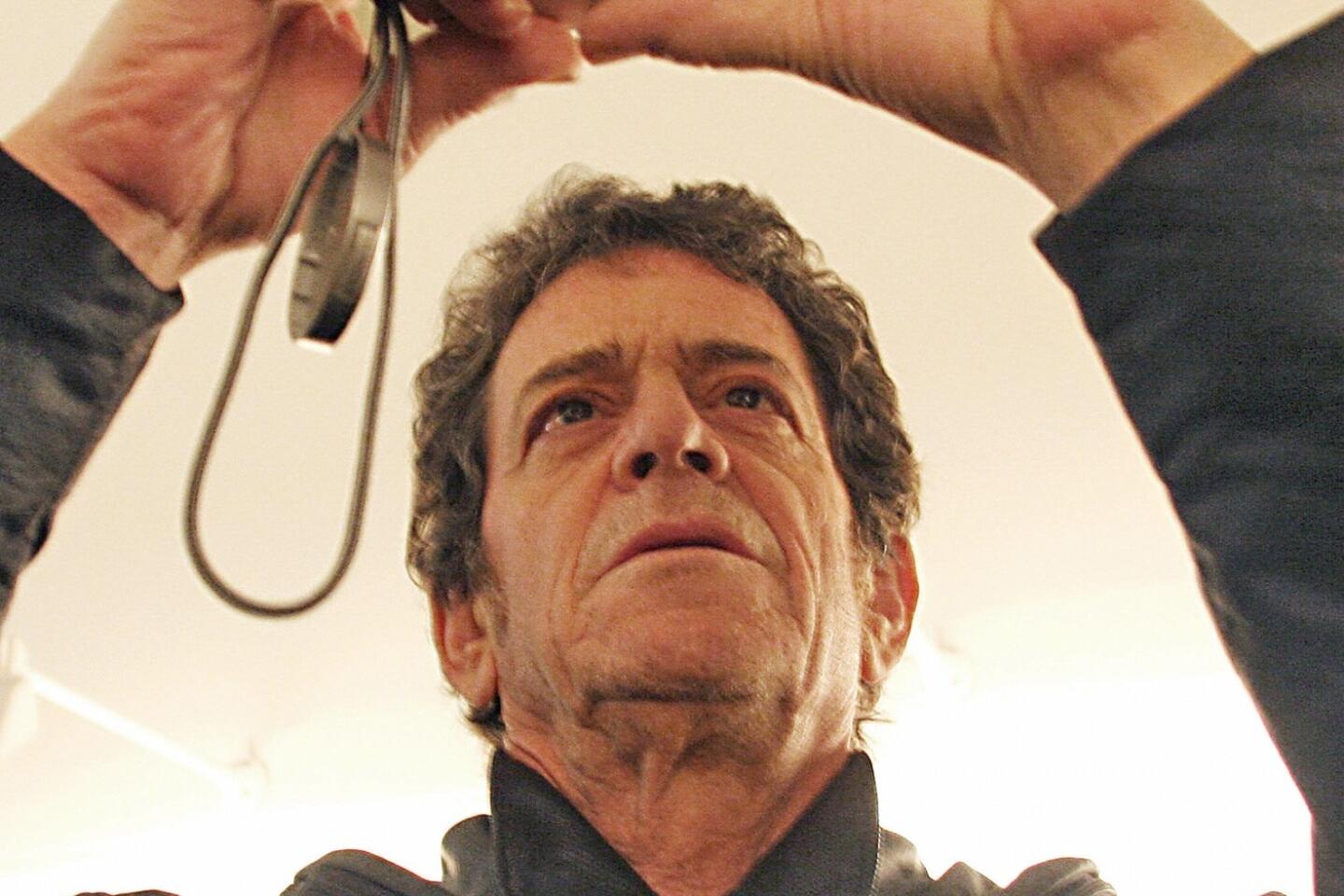Lou Reed talks to Robert Hilburn: âGod protects fools and drunksâ
Given that Lou Reedâs deeply affecting new âMagic and Lossâ album is a poignant reflection on the cancer-related deaths of two of the songwriterâs closest friends, itâs surprising to see him light up a small cigar during an interview.
By the third puff, Reed is self-conscious enough about the large webs of smoke that he addresses the point.
âIâm trying to give up cigarettes,â he explains, leaning forward in the chair in a 14th-floor office near Central Park South. Looking at the cigar in his hand, he adds, âThis doesnât count because Iâm not inhaling.â
Reed, wearing a T-shirt and jeans, may be known for a dry, even wicked sense of humor, but heâs not laughing. He says he really is trying to give up cigarettes, even banning smoking at the recent band rehearsals for his European tour.
There was a time not that long ago when an anxious Reed went through half a pack of cigarettes during a single interview--and weâre not talking about marathon sessions. Reed, 48, has never liked interviews--his attitude during them has been described over the years as everything from hostile to indifferent.
âI donât mind questions about my work, but interviews are always so personality oriented,â he says. âIâve been asked questions time after time that Iâd describe as grotesque and horrible . . . questions that a friend wouldnât even ask a friend. For years I just took Andy Warholâs advice and lied.â
Reedâs often colorful fabrications about his background and views added to the mystery and debate stirred by his stark, often troubling music with the Velvet Underground band that was part of the Warhol circle in the late â60s.
The Long Island, N.Y., native wrote about such themes as drugs and sex in an unflinching way that was accepted in books and films, but which shocked pop audiences. âWalk on the Wild Side,â his 1973 solo hit, remains a quintessential pop expression of urban decadence.
Despite occasional brilliance in the â70s and early â80s, Reedâs legacy seemed destined just three years ago to remain tied to his Velvet Underground compositions, which expanded the subject range and literary ambitions of rock.
But Reed has put together a body of work since 1989 that rivals the artistic glow of his Underground days: âNew York,â a sobering album about urban disillusionment; âSongs for Drella,â a musical biography of Warhol that he wrote and performed with ex-Velvets partner John Cale, and now âMagic and Loss,â which was inspired by the deaths of songwriter Doc Pomus, who co-wrote such hits as âSave the Last Dance for Meâ and âYoung Blood,â and someone identified simply as Rita.
Along with a just-published book titled âBetween Thought and Expression: Selected Lyrics of Lou Reed,â the three collections may finally guarantee that Reed will be seen as one of rockâs greatest artists rather than just one of its most exotic figures.
Question: When did your battles with the media begin? Were the Velvet Underground albums acclaimed?
Answer: We were mauled by critics. Now everyone says they loved the Velvet Underground, but that means a lot of people must have changed their minds. Mostly, though, critics didnât waste their time on us because we werenât even small potatoes at the time. We were like little strands of rice. It meant nothing to savage us. So everyone just went after Warhol, which was a real training ground for me because I watched all that . . . how people came at Andy and how he handled it.
Q: What did you learn?
A: Some writer was asking me something once, and Andy said, âYouâre not going to tell the truth are you? You know you donât have to tell the truth. You can say anything you want,â and thatâs what I did for years. Unfortunately, Iâm still haunted by those lies. People continue to ask, âDid you really put a rifle to a guyâs headâ and âDo you really have a degree in music from Harvard?â
Q: Why did you make things up? Was it just for fun or was it your way of showing contempt for the questions?
A: Protection. We just got so used to being attacked, especially when the songs were very sensitive and personal. I still feel vulnerable during interviews. I know that writers say the reason they ask personal questions is that the work is so personal, but there is a line that any sensitive person should recognize.
Interviewers feel it is fair game to say to me, âAre you afraid of dying?â or âHow would you feel if you had a fatal disease?â And, I just donât think those questions are appropriate. Iâve said what I want to say about all that in the album. . . . Maybe Iâm too sensitive, so what can you do? If I wasnât that way, I probably wouldnât be able to do what I do in the first place.
Q: A lot of other major artists, from Sting to Paul Simon, think that it helps listeners to better understand and identify with the work if they talk about their personal feelings in interviews.
A: Iâm different. I try to put everything a person should need to know in the album. To me, all the interest in the personal stuff seems to have more to do with the issue of celebrity--and all that stuff annoys me. The only thing good about being a celebrity to me is that you can use it to draw attention to things you care about . . . such as various human rights things (Reed has been active in support of Amnesty International).
Q: In the introduction to the book, you said your aim always was to write lyrics that could stand alone--apart from the music. When you chose songs for the book, were you surprised which ones stood alone best?
A: No. I just made a checklist of the ones in my head that I felt would work. Remember, Iâve got a BA in English (from Syracuse University) and my idea was always to write lyrics that would be able to stand by themselves. That doesnât mean that all rock ânâ roll songs have to be that way. I had a song called âI Love You Suzanneâ that isnât going to do anything by itself, but itâs not supposed to either. Itâs just one of those fun things . . . essentially mindless.
Q: What about your themes?
A: I know it sounds pretentious, but I wanted to elevate rock ânâ roll . . . bring a Brecht/Weill sensibility to it. Why not? Youâre not 15 forever, but suppose you like rock ânâ roll. Do you want to always keep listening to stuff from when you were a kid? Are you doomed to jazz and classical music forever once you pass 30 and 35? . . . I donât particularly think that classical or jazz is better music. Music is music.
Q: Did it surprise you when people started calling your themes shocking?
A: Of course. There was nothing in those songs that I hadnât read about in books or seen in movies. âMan With the Golden Armâ had been out for years before I wrote âHeroin.â When people started yelling, I thought, âGo take after (âMan With the Golden Armâ author) Nelson Algren, for Christâs sake.â
Q: Letâs go back to the beginning. Do you remember the first records that really excited you . . . made you want to be in a band?
A: Sure, âThe Fat Manâ by Fats Domino, and Little Richard. . . . âTutti-Fruttiâ and âLong Tall Sally.â When I heard them on the radio, they encompassed everything that was missing from my world. Put it this way: Wherever Little Richard was . . . was where I wanted to be.
Q: What did those records represent? Sex, adventure?
A: Freedom. Thatâs what I heard and itâs what I still think of when I think of rock ânâ roll. Listening to the radio absolutely transformed me. It was like a huge major league signal that there was another world, another life out there . . . that everything wasnât as horrible as where I was. I started off trying to write one of those hits and had my first record out when I was 14: âLeave Her for Meâ and âSo Blue.â One was a typical fast one and the other was a typical slow one.
Q: Remember the lyrics?
A: Sure (laughing). âSo blue, so blue/Iâm always crying over you.â That was one and the other was: âTake away the ocean/Take away the sea/Take away the blue sky/But, please, leave her for me.â
Q: When did you begin to make the transition?
A: When I was in college. I kept playing in bands. . . . Just rhythm guitar on the hits of the day. . . . âTwist and Shout,â the (Hank Ballard) âAnnieâ records, pretty bluesy for Upstate New York. But also pretty bad. At the same time, though, I was reading people like Hubert Selby and Raymond Chandler and Delmore Schwartz and I wanted to be a writer. So, I wrote songs (including âHeroinâ) . . . just for me, never thinking of doing anything with them.
Q: How do you look now at your body of work? Do you see a continuum or do you see major ups and downs?
A: There are individual songs on albums over the years that I think are every bit as good as the songs on âNew York.â There are albums that people say were terrible failures that I like, so what can you do?
Q: Everyone seems to agree you are on a creative roll now. Was there a time when you worried about whether you could maintain the old Underground quality?
A: Most of my life. For years, I just thought that every once in a while I get lucky. I mean I still feel that way, but I just know itâs not true. I know now that I am a creative person. . . . That is part of my living and breathing. On any given day, I might not be able to come up with something . . . maybe not even for the rest of the week or the week after, but eventually Iâll be all right.
Q: What would you tell yourself during those times when you thought you had lost your creativity?
A: Thatâs a devastating feeling and you start thinking what is it that you can do to like hot-rod your writing. . . . And, well, you could end up blowing out all the 70s for me, just from that theory.
Q: Are you referring to all the stories we heard about Lou Reed and drugs . . . and eccentric behavior in the â70s?
A: Yeah. . . . You medicate yourself so you can create and, of course, I found it to be just the opposite effect. All that just makes it worse. This isnât to say that the stuff I did (in the â70s) wasnât any good. I just believe I would have gotten to X a lot faster if I hadnât like waylaid myself and made things more difficult by doing things like that.
But youâre young and . . . youâre already going 1,000 miles an hour and the (pressures) build up. . . . I still have a drink now and then, but itâs a completely different situation. Before, I needed the drugs and liquor. . . . It calmed me.
Q: What about the new album? âThe Halloween Paradeâ from the âNew Yorkâ album was about AIDS and the loss of friends. Thereâs even a reference in it to âRotten Rita.â Do you see a thread from it to the new album?
A: I would take it all the way back to âIâll Be Your Mirrorâ (in 1967), but I donât sit down and say, âThis album is going to be about this or that.â I really trust my instincts. I was originally going to write an album about magic . . . the desire for magic in life . . . the magic of transformation . . . the idea of a man turning into a bird. I had some friends who told me about some things and I was thinking about all that.
But my two friends died during this time and I wrote âWhatâs Goodâ and that started the other songs, not necessarily in order you find them on the album. It was painful to write, but it was obvious what it was about. All I had to do was look at that line, âWhat good is cancer in April,â and I knew.
Q: Did you try to resist the theme? Did you worry that it was going to be too âdownâ an album?
A: What could I have done? These were the songs I was writing--the ones that were coming out. The only alternative I could have was to write the songs and put them on the shelf and then do something else. But you put every ounce of yourself in the album and you fall in love with it and you want to share it.
Q: A lot of people would probably be surprised that you were friends with Doc Pomus because you were from such distinctly different rock generations.
A: I just knew him a couple of years, but I used to love to pop over to his apartment. He was one of those people who are like the sun. You just feel great when you are around them. He doesnât have to say anything. You just walk in and . . . boom! . . . you feel great. I think his music contained a bit of that. This was a guy singing in blues clubs on his crutches. (Pomus was unable to walk because of a polio condition as a youngster). When I was in the hospital with him, he said he was working on a song and he showed me the lyric: âLifeâs Killing Me.â (Reed laughs). You donât run across people like that.
Q: Pomus wrote so many hits that thereâll probably be a lot written about him in connection with the album, but there probably wonât be much written about Rita. Does that seem unfair? Do you want to say anything about Rita?
A: No, Rita wouldnât have wanted to be known. . . . I was a very lucky person to know her.
Q: At one point in the album, you say, âYou loved a life others throw away nightly.â
A: Or daily for that matter, just a couple of blocks away (pointing out the window to the streets). It struck me that here was this person fighting desperately for life, while just two blocks away people are shooting it away or drinking it away or doing terrible, reckless things. They donât give a damn about their lives.
Q: Do you ever wonder how you made it through some of the troubled years--how you avoided throwing your life away?
A: I guess itâs like they say: God protects fools and drunks. . . . Now, I guess Iâm on my own.
PHOTOS: Notable deaths of 2013
More to Read
The biggest entertainment stories
Get our big stories about Hollywood, film, television, music, arts, culture and more right in your inbox as soon as they publish.
You may occasionally receive promotional content from the Los Angeles Times.















